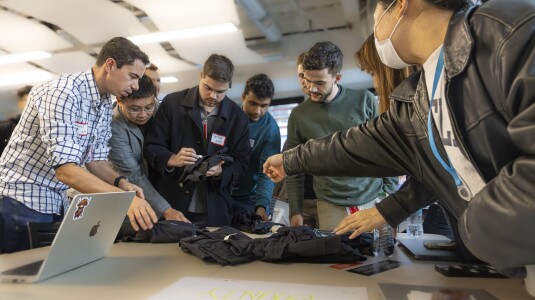In September 2020, Columbia University and Amazon partnered to create the Columbia Center of Artificial Intelligence Technology (CAIT), a multiyear collaboration between Columbia Engineering and Amazon to support research, education, and outreach programs.
Out of the discussions around CAIT emerged the idea for a summer research internship that would provide opportunities for students from historically underrepresented backgrounds to pursue careers in STEM fields. And in the summer of 2021, we launched the Columbia-Amazon Summer Undergraduate Research Experience (SURE) program.
SURE is an eight-week summer program in which a diverse group of undergraduates, many of whom come from backgrounds historically underrepresented in STEM fields, do original scientific research under the supervision of Columbia University faculty, with additional professional training from Amazon mentors. Students and faculty are encouraged to select projects that reflect mutual interests, including those that confront societal challenges such as resource conservation and management, equal access for people with disabilities, and the diagnosis and treatment of disease.
Amazon and Columbia Engineering cosponsor the program, which includes workshops, trainings, and panel discussions on topics related to career management, graduate study and academic research opportunities, diversity and inclusion in tech, and scientific culture in both academia and industry, at an average of one a week during the internship period.
The initial SURE class comprised 26 students from 12 U.S. states and territories (including Guam and Puerto Rico), 54% of whom identified as Black or multiracial, 19% of whom identified as Hispanic, and 58% of whom identified as female. In a survey conducted at the end of the program, 74% of respondents said that SURE either exceeded or far exceeded their expectations, and 100% of respondents said that they are “extremely likely” to recommend the program to classmates and peers.

After the session, the SURE team also polled faculty mentors about their experiences, and 100% of respondents said that they would recommend participation in the SURE program to their faculty colleagues. The surveys were conducted by Libby Goss, manager of the SURE program, and Shavonna Q. Hinton, assistant dean for Diversity, Equity, and Inclusion at Columbia Engineering.
“I was able to get much more involved in the projects than I had initially expected,” one of the students told the survey team. “I felt like the work I was doing was useful and that I was making a significant contribution to the team.”
“Columbia SURE has been one of the most enriching experiences in my undergraduate degree,” said another. “I was afforded a fast-paced experience in the BME [biomedical engineering] niche I am most interested in, cell and tissue engineering. Within four weeks, I was fully immersed in working with nanoparticles, cancer cells, and engineered cell lines.”
Student projects
Another measure of the program’s success is the breadth and quality of the projects in which the students participated. In some cases, students made contributions to large, ongoing projects in their mentors’ research groups; in other cases, they developed their own, small-scale projects that could be completed in a summer and complemented or enhanced ongoing projects.
Several students worked on problems in biomedicine, using both biological and computational tools: identifying the genetic pathways that lead to overactivation of the immune response; using CRISPR to help understand organ formation in embryos and how it goes awry; investigating the mechanism whereby the COVID virus infects cells; automatically interpreting OCT breast scans; and developing models that predict preterm birth from uterine ultrasound data, among others.

Two projects focused on water management — using computer vision to gauge the extent of irrigation in sub-Saharan Africa and evaluating small-scale, decentralized approaches to wastewater treatment — and another focused on the effect of urban tree planting on surface temperatures. Other students concentrated on problems in chemistry and materials science.
And, of course, several projects dealt with information technology and electrical engineering. Two students worked on different projects that involved interpreting data from the Internet of things; another student measured the coverage of several experimental long-range data networks in the urban environment; others created a Web interface to provide access to a system that uses machine learning to sharpen MRI images; and one student did a project on using machine learning to manage the operation of lithium-ion battery packs, based on measurements of voltage, temperature, and other factors.
In light of the enthusiastic response to the inaugural instance of the Columbia-Amazon SURE internship program, we plan to expand the program in 2022 — increasing enrollment to 50 students and extending the program length to 10 weeks. The program will also provide graduate fellowships for students from historically underrepresented populations to pursue Columbia master’s degrees in STEM fields.
Please visit the program page to learn more about the SURE program and to apply for a SURE fellowship.





